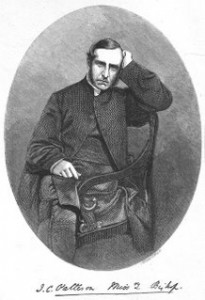Today's matchup is a battle between two learned gentlemen separated by 14 centuries. While both were great linguists, one sat around translating Scripture and became a hermit (Jerome) while the other went to New Zealand to become a bishop and martyr (Patteson). So, would you rather be a hermit or a martyr? Or a martyred hermit for that matter?
In recent action, Joan of Arc trounced Lancelot Andrewes (62% to 38%). Check out the updated bracket.
 Jerome (c.347-420) was the most famous biblical scholar of ancient Christianity. The Latin version of the Bible known as the Vulgate (from the Latin vulgata, meaning “common”), translated from the original languages of Hebrew and Greek, was mostly the fruit of his work. It brought to an end the great differences between various Latin biblical texts that were circulating in the late 4th century. His writings also included biblical commentaries, which offered a variety of linguistic and topographical information to interpret the scriptures; attacks against the heresies of Arianism, Pelagianism, and Origenism; and letters that advocated extreme asceticism.
Jerome (c.347-420) was the most famous biblical scholar of ancient Christianity. The Latin version of the Bible known as the Vulgate (from the Latin vulgata, meaning “common”), translated from the original languages of Hebrew and Greek, was mostly the fruit of his work. It brought to an end the great differences between various Latin biblical texts that were circulating in the late 4th century. His writings also included biblical commentaries, which offered a variety of linguistic and topographical information to interpret the scriptures; attacks against the heresies of Arianism, Pelagianism, and Origenism; and letters that advocated extreme asceticism.
Rome is where Jerome lived as a student and was baptized as a Christian. He became a hermit (i.e., someone who retreats for religious reasons into a solitary life) for a period of four or five years in the Syrian desert. Leaving behind that solitude, he was later ordained a priest and became secretary to Pope Damasus from 382 to 384. During those same years, at the Pope’s request, Jerome revised the existing translations of the four gospels.
Finally, in 386, Jerome settled in Bethlehem, belonging to a monastery and devoting himself to a life of study. There he continued his work, begun in Rome, producing numerous biblical translations. After his death, these would be collected into a single Bible, the Vulgate, probably in the 6th century. For more than a thousand years, the Vulgate was the definitive biblical text of Western Christianity.
Collect for Jerome: O Lord, O God of truth, your Word is a lantern to our feet and a light upon our path: We give you thanks for your servant Jerome, and those who, following in his steps, have labored to render the Holy Scriptures in the language of the people; and we pray that your Holy Spirit will overshadow us as we read the written Word, and that Christ, the living Word, will transform us according to your righteous will; through Jesus Christ our Lord, who lives and reigns with you and the Holy Spirit, one God, now and for ever. Amen.
-- Neil Alan Willard
 John Patteson (1 April 1827 – 20 September 1871) was the elder son of Sir John Patteson the judge, by his second wife, Frances Duke Coleridge. He was educated at a private school in Devon and then at Eton. He was a good student and sportsman. He was also deeply religious. In 1845 he went to Oxford where he was influenced by the Oxford Movement. He studied briefly in Germany. There he became competent in Hebrew and Arabic and showed his outstanding flair for languages. Ordained deacon in 1853 and priest the following year, he offered himself to Bishop Selwyn for work in Melanesia. He arrived in New Zealand in 1855. Two years later he was put in charge of the Melanesian Mission. He founded a college on Norfolk Island for native boys, toured the islands on the ship Southern Cross, and learned more than twenty of the local languages.
John Patteson (1 April 1827 – 20 September 1871) was the elder son of Sir John Patteson the judge, by his second wife, Frances Duke Coleridge. He was educated at a private school in Devon and then at Eton. He was a good student and sportsman. He was also deeply religious. In 1845 he went to Oxford where he was influenced by the Oxford Movement. He studied briefly in Germany. There he became competent in Hebrew and Arabic and showed his outstanding flair for languages. Ordained deacon in 1853 and priest the following year, he offered himself to Bishop Selwyn for work in Melanesia. He arrived in New Zealand in 1855. Two years later he was put in charge of the Melanesian Mission. He founded a college on Norfolk Island for native boys, toured the islands on the ship Southern Cross, and learned more than twenty of the local languages.
On 24 February 1861 Patteson was ordained as the first Bishop of Melanesia.
Travel in Melanesia was always risky, and Patteson’s life was often in danger. His health suffered in the 1860s. On 20 September 1871 Patteson was murdered on the island of Nukapu. Joseph Atkin and Stephen Taroaniara, who accompanied Patteson, died a week later of wounds received at the time. It was widely believed that Patteson’s death was in retaliation for the “slave” trading, but this is by no means certain. Patteson’s death did however ensure more rigorous regulations on labour trading, and gave strong impetus in England to the missionary work of the church.
Collect for John Patteson: God of the southern isles and seas, we remember with thanksgiving your servant John Patteson, whose life was taken by those for whom he would freely have given it; grant us the same courage in extending your gospel and readiness to share our life with others, for the sake of Jesus Christ our Redeemer, who is alive with you in the unity of the Holy Spirit, one God, for ever and ever. Amen.
-- Bosco Peters
Vote!
[poll id="18"]
53 comments on “Jerome vs. John Patteson”
Patteson had me at "learned Arabic & ministered in Melanesia."
1. In this Islamophobic culture in which we live, my vote goes to the guy who learns the languages of the places to which he is called. Something we could all learn a bit from. We need reconciliation and recognition
2. We need reminders that Episcopal & Evangelism are not contradictory
So hear! hear! for Patteson. Besides, everyone knows about Jerome.
Jerome is possibly the most misanthropic crank ever to darken the door of a church. In this age in which saccharine is too often equated with saintly, I'm voting for him.
This is great so much fun and educational
Go team Jerome!!!
This is reason enough to vote down Jerome (although I secretly hope he wins so Mary Magdelene can kick his butt!):
"A very important alteration is made by Jerome in Genesis 3.16. God has been addressing severe words to the serpent in the garden and he finishes his warning to Eve with the words: 'Your desire will be for your husband, and he will rule over you,' While 'he will rule over you' makes clear the husband's predominance over the wife, the impact is softened somewhat by the other half of the verse, 'Your desire will be for your husband', the Hebrew word for 'desire' here having sexual content. In Jerome's version, however, that half of the verse is changed to 'You will be under the power of your husband' and 'he will rule over you' completes the verse. Complete subjection and subordination of the woman is now laid down.
This verse was much quoted, in its new form, by later writers in their exegesis of Genesis 3 and discussion of the situation of women after Eve's sin in the garden." Jane Barr from http://www.womenpriests.org/theology/barr.asp
Recluse v. missionary? Patteson gets my vote
Jerome should be considered in context of his own century, rather than suffering slams from our own century. His attitude toward women actually may have been enlightened in the 4th & 5th centuries. Or not. We need a scholar to describe that ancient culture to us moderns. Jerome's vulgate translation helped more people access the scriptures during his lifetime and, in a way, helps us in our lifetimes. Now, about Mr. Patteson, what was that slave trade business? That vague reference clouds the memory of his work. What exactly was going on in Melanesia then? Historical mysteries not withstanding, I vote for Jerome.
I haven't entered this discussion, because it is true that Jerome should be judged by the standards of his day.
The standards of his day did include not changing scripture to avoid inconvenient truths. Jerome fails. He added words in 2 Samuel 1.26:
doleo super te frater mi Ionathan decore nimis et amabilis super amorem mulierum
I grieve for thee, my brother Jonathan: exceeding beautiful, and amiable to me above the love of women. As the mother loveth her only son, so did I love thee.
There is nothing about a mother's love in the original. Apparently Jerome was uncomfortable with David saying he loved Jonathan more than women.
You don't change scripture to meet your preferences.
Is there a specific place to look for the winners of the previous day's vote? I am so happy I found this website. You guys are awesome and I am having a great time learning about the saints. You rock!!!!!!!!!!!!!!
Shannon, if you go to the Home page and click "Bracket 2012" at the top, you'll see an update.
Thank you so much. Guess I need to be smarter than the web page!
As someone who was a librarian I was leaning toward to Jerome... after the day I've had dealing with fallout of some bigotry I have to go with the anti-slavery guy... I don't think voting from all 4 of my devices will make a difference in the outcome.
Hrrrrmmm...sitting around reading something and deciding to write it in a different language...or following Gods calling to the point of going to New Zealand (now there's a mission that i would love to undertake) and touring several kazzilion islands while having to teach completely foreign children, learning 20 different ways to talk to them, and all while trying to make sure that they don't grow up to be slaves. Sheesh, Jerome was practically the patron saint of sexism. I'm voting for Patteson.
I've got to support the local(ish) - voting southern hemisphere.
Jerome, best two out of three falls
This is great fun, and very edifying besides. I didn't know squat about Bp. Patteson, and now I do - thanks. Had to vote for Jerome, though.
How do I vote? Personally my money is on Jerome